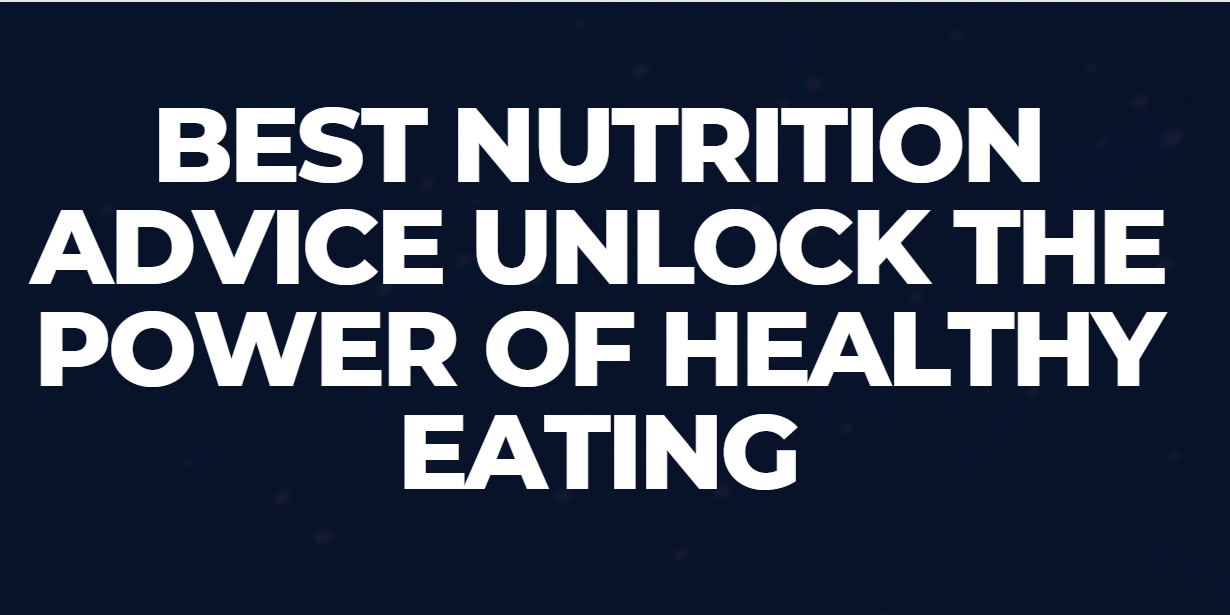Best Nutrition Advice Unlock the Power of Healthy Eating

The best nutrition advice is to eat a balanced diet that includes a variety of fruits, vegetables, whole grains, lean proteins, and healthy fats. By incorporating these foods into your daily meals, you can ensure that your body receives the essential nutrients it needs to function properly and maintain optimal health.
A balanced diet should also include drinking plenty of water and limiting the intake of sugary beverages, processed foods, and unhealthy fats. Additionally, it is important to listen to your body’s hunger and fullness cues, eat mindfully, and practice portion control.
Prioritizing nutritious, whole foods over processed and unhealthy options can help promote overall wellness and prevent chronic diseases.
Achieving Healthy Eating With Best Nutrition Advice
The best nutrition advice focuses on achieving healthy eating through a balanced diet. It is essential to understand the macronutrients and micronutrients that our bodies need to function optimally. Macronutrients include carbohydrates, proteins, and fats, which provide energy and support various bodily functions. Micronutrients, such as vitamins and minerals, are necessary in smaller quantities and play a crucial role in maintaining overall health.
Hydration is also a critical aspect of nutrition. Staying properly hydrated is important as water helps regulate body temperature, aids in digestion, and helps transport nutrients throughout the body. It is recommended to drink eight glasses of water per day, but individual needs may vary depending on factors such as activity level and climate.
To achieve a balanced diet, it is important to consume a variety of whole foods, including fruits, vegetables, whole grains, lean proteins, and healthy fats. These foods provide a wide range of nutrients and minimize the intake of processed and unhealthy options.
In summary, the best nutrition advice emphasizes the consumption of a balanced diet that includes macronutrients, micronutrients, and adequate hydration. By focusing on whole foods and making mindful choices, individuals can support their overall health and well-being.
Core Principles Of Nutritious Diets
Eating a nutritious diet is essential for maintaining good health and well-being. When it comes to making healthy food choices, it is important to prioritize whole foods over processed foods. Whole foods are natural, unprocessed ingredients that offer a wide range of nutrients and health benefits.
They are rich in vitamins, minerals, fiber, and antioxidants that support optimal health. Additionally, whole foods are usually lower in added sugars, sodium, and unhealthy fats compared to processed foods. To ensure a well-rounded diet, it is important to include a variety of foods from different food groups.
Variety and moderation in food selection is key to ensure a balance of nutrients. Finally, prioritizing plant-based ingredients can have numerous health benefits. Plant-based diets are rich in fiber, phytonutrients, and antioxidants, and have been associated with reduced risk of chronic diseases such as heart disease, obesity, and certain types of cancer.
Foods That Enhance Well-being
When it comes to enhancing our well-being through nutrition, there are certain foods that stand out as nutritional powerhouses. Fruits and vegetables should be at the top of everyone’s list. They are packed with essential vitamins, minerals, and antioxidants that support overall health and boost our immune system. Additionally, they are low in calories and high in fiber, making them a great choice for weight management.
Another important component of a well-balanced diet is lean proteins. These proteins are vital for muscle health and repair. They provide the necessary amino acids for building and maintaining strong muscles. Good sources of lean proteins include lean meats, poultry, fish, beans, and legumes. Incorporating these into our diet can help promote optimal muscle growth and enhance recovery after exercise.
Healthy fats, such as those found in avocados, nuts, and olive oil, also play a crucial role in our well-being. They provide us with essential fatty acids that support brain function, heart health, and hormone balance. These fats can be incorporated into our diet through cooking, dressing salads, or even as a snack. However, it’s important to moderate our intake as fats are high in calories.
Decoding Dietary Guidelines
Official nutritional recommendations are constantly evolving to reflect new research and understanding. As a result, it can be challenging to navigate the abundance of information available. This blog post will help you understand and interpret the food pyramid for your daily life.
The food pyramid serves as a visual representation of recommended food groups and servings. It emphasizes the importance of a balanced diet, including fruits, vegetables, grains, protein, and dairy. However, it’s crucial to adapt these guidelines to your individual health needs.
If you have specific dietary requirements or health concerns, consult with a registered dietitian or healthcare professional. They can provide personalized recommendations and guide you in making informed choices that align with your unique circumstances.
Remember, nutrition is not a one-size-fits-all approach. By understanding and adapting the official guidelines, you’ll be able to make informed decisions about your diet and promote your overall health and well-being.
Strategic Meal Planning Tips
Strategic meal planning is crucial for achieving a balanced and nutritious diet. Incorporating all food groups into your meals ensures that you are getting a wide range of essential nutrients. Remember to balance your calorie intake with energy expenditure to maintain a healthy weight. Planning for meals and snacks on-the-go helps you avoid unhealthy food choices when you’re busy or away from home.
Mindful Eating For Better Health
Mindful eating is a holistic approach to nourishing your body and cultivating a positive relationship with food. It involves paying full attention to the experience of eating, including the taste, texture, and smell of each bite. By practicing mindful eating, you can make more informed decisions about your food choices and improve your overall health and well-being.
Mindfulness plays a pivotal role in making conscious and healthy food choices. By being aware of your thoughts and emotions, you can identify triggers that may lead to unhealthy eating habits. Mindfulness allows you to detach from these triggers and make choices that align with your nutritional goals. It also helps in breaking the cycle of mindless snacking and emotional eating.
An important aspect of mindful eating is tuning in to your body’s hunger signals. This means eating when you are truly hungry and stopping when you are satisfied, rather than eating out of habit or for emotional reasons. By listening to your body, you can maintain a healthy weight and prevent overeating.
Another key aspect of mindful eating is being aware of your eating speed. Slow and mindful chewing allows for better digestion, as it gives your body enough time to properly break down food and absorb nutrients. Eating too quickly, on the other hand, can lead to digestive issues such as bloating and indigestion.
By incorporating mindfulness into your eating habits, you can make more conscious food choices, listen to your body, and improve your digestion. Practicing mindful eating can help you develop a healthier relationship with food and ultimately lead to better overall health.
Reading And Understanding Food Labels
When it comes to making informed choices about our nutrition, reading and understanding food labels plays a crucial role. Deciphering nutrition facts and ingredient lists is the first step towards knowing what we are putting into our bodies.
One important aspect to consider is spotting hidden sugars and unhealthy fats. Manufacturers often use various names for sugars, such as high fructose corn syrup, maltose, or sucrose, making it essential to pay attention to the ingredients list. Similarly, being aware of unhealthy fats such as trans fats and saturated fats can help us make better choices.
Gauging serving sizes and portions accurately is another key aspect of reading food labels. By understanding the size of a recommended serving, we can monitor our calorie intake more effectively. Comparing it to the portion we actually consume can help us make healthier decisions.
Superfoods And Their Superpowers
Superfoods are a great way to boost your nutrition and overall health. These powerful foods are packed with essential nutrients and have been shown to provide numerous health benefits. But what exactly are superfoods?
Superfoods are defined as nutrient-dense foods that are especially beneficial for health and well-being. They are rich in vitamins, minerals, antioxidants, and other beneficial compounds. Some popular examples of superfoods include berries, leafy greens, fatty fish, nuts, and seeds.
Integrating superfoods into your everyday meals is easier than you might think. You can add berries to your morning oatmeal, sprinkle flaxseeds on your salad, or include spinach in your smoothies. These small changes can make a big difference in your overall health.
However, it is important to note that there are also some myths surrounding superfoods. While they are indeed nutritious, they are not magical cure-alls. They should be viewed as part of a balanced diet, rather than a sole solution to all health problems.
The Science Of Supplements
Considering dietary supplements is a common practice among individuals who seek to enhance their overall well-being. However, it is important to approach this topic with careful consideration and understanding. When it comes to choosing the right vitamins and minerals, it is crucial to prioritize your individual needs and consult with a healthcare professional. They can provide guidance based on your specific health goals and potential deficiencies.
Navigating the world of probiotics and antioxidants can be overwhelming, but conducting thorough research and reading customer reviews can help to make informed decisions. Keep in mind that supplements should not replace a balanced diet and healthy lifestyle, but rather complement them. Remember, everyone’s body is unique, so it’s important to listen to your own needs and work closely with a healthcare professional for the best results.
Yoga for Health : Unlock Your Full Potential
Nourishing Your Body Throughout Life
Adapting nutrition for different life stages is crucial for overall health and well-being. During pregnancy, maintaining a balanced and nutrient-rich diet is essential for the growth and development of the baby. Incorporating foods rich in folate, iron, calcium, and omega-3 fatty acids can support the baby’s brain development and prevent birth defects.
Similarly, in childhood, a balanced diet with a variety of fruits, vegetables, whole grains, and lean proteins is vital for proper growth and development.
As we age, it becomes important to adjust our eating habits to support aging and senior health. Nutrient-dense foods like fruits, vegetables, and whole grains can help maintain bone health and prevent chronic diseases. Adequate protein intake is also crucial to preserve muscle mass and strength. Additionally, staying hydrated and limiting sodium intake can support heart health and manage blood pressure.
Nourishing your body with the right nutrients throughout life can have a lasting impact on your overall health and well-being. By making conscious food choices and adapting your diet to different life stages, you can optimize your nutritional intake and promote a healthy and fulfilling life.
Common Nutritional Challenges And Solutions
| Addressing dietary restrictions and allergies: | Eating a balanced diet becomes more challenging for individuals with dietary restrictions or allergies. Follow these strategies to overcome these obstacles:
|
| Overcoming common obstacles to healthy eating: | Many people face challenges when trying to maintain a nutritious diet. Here are some strategies to overcome common obstacles:
|
| Strategies for dealing with emotional eating: | Emotional eating can undermine your efforts to maintain a healthy diet. Try these strategies to overcome emotional eating:
|
Engaging With Diet Professionals
Engaging with diet professionals, such as dietitians or nutritionists, can provide valuable insights and guidance when it comes to optimizing your nutrition. Knowing when to seek advice from these experts is essential for improving your overall health and well-being.
Before booking a nutritional consultation, it’s helpful to prepare by documenting your current eating habits and any specific concerns or goals you may have. This will allow the diet professional to tailor their advice to your unique needs.
Building a collaborative relationship with your healthcare provider is also crucial. Sharing your medical history, medications, and any existing conditions will ensure that your nutritional recommendations align with your overall health plan.
Remember, the ultimate goal is to find a balance that works for you. By working closely with diet professionals and staying committed to your own health, you can make informed choices that support your well-being.
Frequently Asked Questions On Best Nutrition Advice
What Are The Essential Nutrients For A Healthy Diet?
A healthy diet should include essential nutrients such as carbohydrates, proteins, fats, vitamins, minerals, and water. These nutrients play a vital role in supporting overall health, growth, and development of the body.
How Can I Improve My Daily Nutrition Intake?
To improve your daily nutrition intake, focus on eating a variety of fruits, vegetables, whole grains, lean proteins, and healthy fats. Limit processed foods, sugary drinks, and unhealthy snacks. Stay hydrated and consider consulting a registered dietitian for personalized guidance.
Is It Important To Read Food Labels?
Yes, reading food labels is important as it helps you make informed choices about what you eat. Check the serving size, ingredients, and nutrient content to understand the nutritional value of the product and make healthier choices based on your dietary needs.
Conclusion
Maintaining a healthy diet plays a vital role in our overall well-being. By following the best nutrition advice discussed in this blog post, you can ensure that you are fueling your body with the right nutrients. From consuming a balanced mix of fruits, vegetables, lean proteins, and whole grains to staying hydrated and limiting processed foods, these tips can help you lead a healthier lifestyle.
Remember, small changes in your eating habits can lead to significant improvements in your overall health. Start making these changes today and reap the benefits in the long run.




